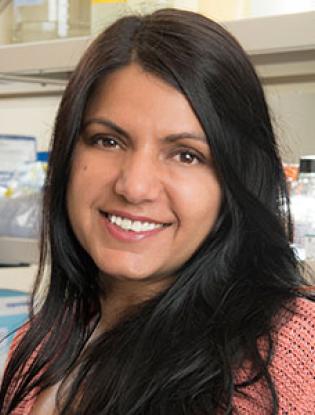Sangeeta Dhawan, Ph.D.

Dr. Dhawan's group is interested in understanding the biology of the insulin producing beta cells. Both type 1 and type 2 diabetes result from the loss of beta cells, making beta cell replenishment a very important therapeutic goal. Approaches to this end include generating beta cells from stem/iPS cells, as well as protecting and regenerating the endogenous beta cells. The successful outcome of each of these approaches demands the generation of abundant numbers of functional beta cells that are survival competent in the diabetic milieu. With this in mind, the research in Dhawan laboratory focuses on understanding the epigenetic and cellular signaling pathways that regulate the formation, function, regeneration and survival of pancreatic beta cells during development, and under circumstances that warrant the repair/regeneration of beta cells. The Dhawan lab leverages this knowledge to understand the dysregulation of epigenetic processes in beta cells during diabetes pathogenesis, and identify novel targets for the prevention and reversal of beta cell loss in diabetes. The Dhawan lab uses genetic approaches, lineage tracing, human islet culture, and high throughput sequencing techniques to address these questions.
Duarte Cancer Center
Duarte, CA 91010
1995 -1997, B.Sc., Biochemistry, Sri Venkateswara College, Delhi University, New Delhi, India
1995 - 1997, M.Sc., Biochemistry, South Campus, Delhi University, New Delhi, India
2003, Ph.D., Developmental biology of the silk gland in the silkworm Bombyx Mori, Indian Institute of Science, Bangalore, India
2005 - 2008, Postdoctoral Fellow, Larry L. Hillblom Islet Research Center, Department of Medicine/Endocrinology University of California Los Angeles
2004-2005, Post-doctoral Fellow, Department of Developmental and Regenerative Biology, Mount Sinai School of Medicine
2003-2004, Postdoctoral Fellow, Beth Israel Deaconess Medical, Center Harvard Medical School
2023-present, Associate Professor, Department of Translational Research and Cellular Therapeutics, Diabetes & Metabolism Research Institute, City of Hope, Duarte, CA
2017-2023, Assistant Professor, Department of Translational Research and Cellular Therapeutics, Diabetes & Metabolism Research Institute, City of Hope, Duarte, CA
2015-2017 Adjunct Associate Professor, Larry L. Hillblom Islet Research Center, Department of Medicine/Endocrinology University of California Los Angeles, Los Angeles, CA
2008-2014 Assistant Researcher, Larry L. Hillblom Islet Research Center, Department of Medicine/Endocrinology University of California Los Angeles, Los Angeles, CA
Research Area
Epigenetic regulation of functional beta cell mass in health and disease
Overview
The Dhawan lab focuses on understanding the biology of insulin producing beta-cells. Both Type 1 and Type 2 diabetes are associated with the loss of pancreatic beta-cells, making the replacement of beta-cells an important therapeutic goal. Approaches to this end include generating beta-cells from stem cells, and protecting and reviving existing beta-cells. In pursuit of this, we study the epigenetic mechanisms that regulate the formation, function, regeneration and survival of beta-cells in homeostasis, and their failure in diabetes.
- Parveen N, Wang JK, Bhattacharya S, Cuala J, Rajkumar MS, Butler AE, Wu X, Shih HP, Georgia SK, Dhawan S. DNA methylation dependent restriction of Tyrosine Hydroxylase contributes to pancreatic beta cell heterogeneity. Diabetes. 2023 May 1; 72(5): 575-589. doi: 10.2337/db22-0506.** **Highlighted in the “In this issue” section of the journal. Accompanied by a commentary article, written by Dr. C. Aguayo-Mazzucato and Dr. M. Stitzel: doi: 10.2337/dbi23-0001.
- Varghese SS, Dhawan S. Senescence: A Double-Edged Sword in Beta-Cell Health and Failure? Front Endocrinol (Lausanne). 2023;14: 1196460. doi: 10.3389/fendo.2023.1196460. eCollection 2023.
- Ma K, Dhawan S. Yo-yo dieting: mixed messages for β-cell plasticity. Diabetes. 2022 Nov 1; 71(11): 2253-2255. doi: 10.2337/dbi22-0024.
- Spaeth JM, Dhawan S. The Yin and Yang of Modulating β-Cell DNA Damage Response and Functional Mass. Diabetes. 2022 Aug 1;71(8):1614-1616. doi: 10.2337/dbi22-0010.
- Varghese SS, Dhawan S. Polycomb Repressive Complexes: Shaping Pancreatic Beta-Cell Destiny in Development and Metabolic Disease. Front Cell Dev Biol. 2022;10:868592. doi: 10.3389/fcell.2022.868592.
- Georgia S, Arda HE, Martinez-Sanchez A, Dhawan S. Editorial: Epigenetics of Glucose Homeostasis. Front Endocrinol (Lausanne). 2022;13:889189. doi: 10.3389/fendo.2022.889189. eCollection 2022.
- Parveen N, Dhawan S. DNA Methylation Patterning and the Regulation of Beta Cell Homeostasis. Front Endocrinol (Lausanne). 2021;12:651258. doi: 10.3389/fendo.2021.651258. eCollection 2021.
- Rodnoi P., Rajkumar M., Md Moin A.S., Georgia S.K., Butler A.E., Dhawan S. Neuropeptide Y expression marks partially differentiated beta-cells in mice and humans. JCI Insight. 2017; 2(12). doi: 10.1172/jci.insight.94005